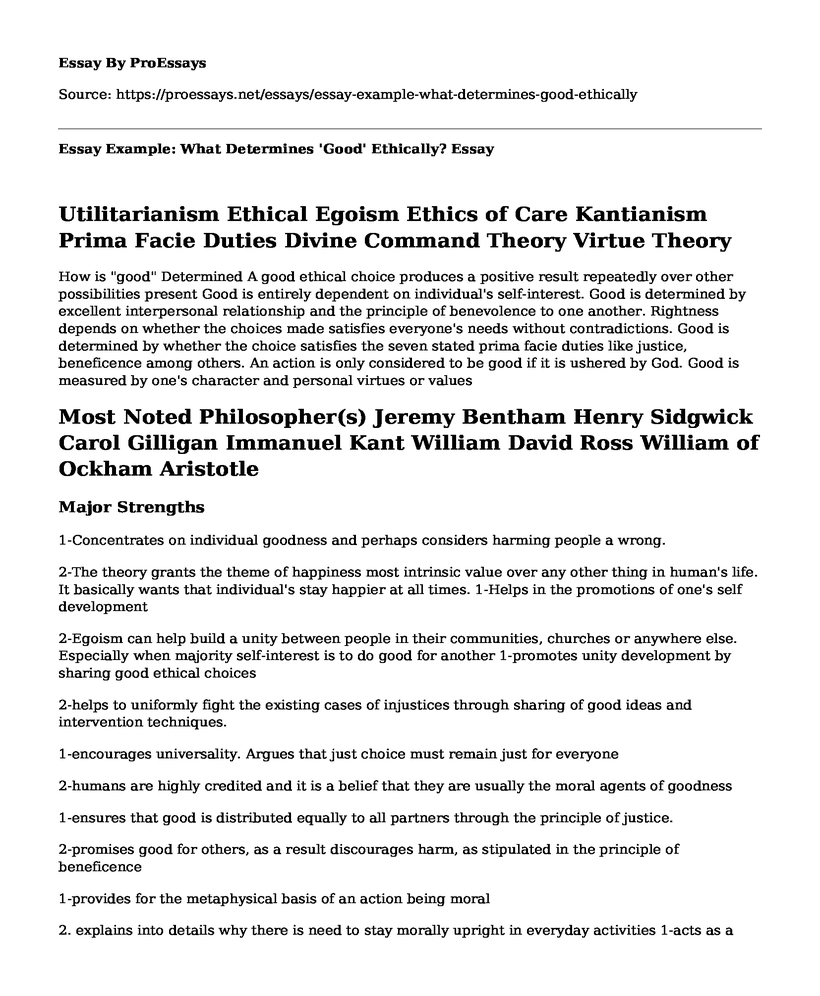Utilitarianism Ethical Egoism Ethics of Care Kantianism Prima Facie Duties Divine Command Theory Virtue Theory
How is "good" Determined A good ethical choice produces a positive result repeatedly over other possibilities present Good is entirely dependent on individual's self-interest. Good is determined by excellent interpersonal relationship and the principle of benevolence to one another. Rightness depends on whether the choices made satisfies everyone's needs without contradictions. Good is determined by whether the choice satisfies the seven stated prima facie duties like justice, beneficence among others. An action is only considered to be good if it is ushered by God. Good is measured by one's character and personal virtues or values
Most Noted Philosopher(s) Jeremy Bentham Henry Sidgwick Carol Gilligan Immanuel Kant William David Ross William of Ockham Aristotle
Major Strengths
1-Concentrates on individual goodness and perhaps considers harming people a wrong.
2-The theory grants the theme of happiness most intrinsic value over any other thing in human's life. It basically wants that individual's stay happier at all times. 1-Helps in the promotions of one's self development
2-Egoism can help build a unity between people in their communities, churches or anywhere else. Especially when majority self-interest is to do good for another 1-promotes unity development by sharing good ethical choices
2-helps to uniformly fight the existing cases of injustices through sharing of good ideas and intervention techniques.
1-encourages universality. Argues that just choice must remain just for everyone
2-humans are highly credited and it is a belief that they are usually the moral agents of goodness
1-ensures that good is distributed equally to all partners through the principle of justice.
2-promises good for others, as a result discourages harm, as stipulated in the principle of beneficence
1-provides for the metaphysical basis of an action being moral
2. explains into details why there is need to stay morally upright in everyday activities 1-acts as a self-motivator, as it provides core values that can help people become good.
2- The theory allows a person to make a correct choice of whatever is just and that which is not. Since the values are meant to boost individual's uprightness both in the line of thinking ad actions
Major Weaknesses
1-It fails to discuss on both sides of the coin. For instance, when one does badly in exchange of good. Killing a person to donate his organs to other patients is an example.
2-The theory gives freedom of choice at an individual basis. However, humans can never be trusted. They may make wrong decisions to benefit themselves, only to claim that they made a right choices. 1-there can be lack of common ideas and views and everyone works independently
2-lacks uniformity majority may consider their actions as good, when in real since, they may not be, in broader picture. 1-may lead into promiscuous decisions. One only wants to listen to ideas from his tribe or region.
2-May cause disunity, originating from ideological differences. 1-do not include various complexities that humans may face in life
2-Does not provide a solution in case of a disagreement, thus seems to be incomplete. 1-fails to discuss the basic inclinations in everyday life such as family and love, in his seven principles
2-Lacks clarity, and difficult to understand, as good is categorized into seven other attributes 1-purely links good morals with God, while it does not explain why.
2- Does not provide any human reference article except for the bible. While on earth, there are different religions. It thus looks like discriminative of some people who are not Christians or believers. 1-fails to specify actions to be considered as morally upright
2-The theory is more of self-centered. Do not show how a person's character can influence the behaviors of others
Cite this page
Essay Example: What Determines 'Good' Ethically?. (2023, Jan 27). Retrieved from https://proessays.net/essays/essay-example-what-determines-good-ethically
If you are the original author of this essay and no longer wish to have it published on the ProEssays website, please click below to request its removal:
- Utilitarianism and Kant's Moral Theories
- Digital Media Ethics and Technology on Climate Change Essay
- Essay Example on Glaucon's Argument Against Socrates on Justice in Plato's Republic
- Business Leaders: Role Model Duty for Ethical Practices - Research Paper
- Epistemology: A Study of Human Knowledge & The Debate Between Rationalism & Empiricism
- Plato's View on the Immortality of the Soul - Essay Sample
- Free Paper on Aristotle on Politics: The Highest Good of Man is Happiness







